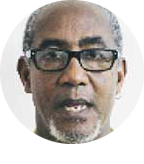“Development should always be about all our people.”

OFTEN in the past we made changes that were supposed to improve life for the future, but there are times what we discard for futuristic goals may not be the answer to our needs.
Take for instance the change from traditional crops like sugar, coconut products, planting of yard foods, selling of fruits like mangoes to neighbouring islands, growing coffee and cocoa, fishing for leisure and as a professional way of life… all gone down the drain.
All these fine things were sacrificed for the coming of bananas as so-called ‘green gold’. Granted, there have been many gains economically and otherwise, but have we assessed the loss?
Firstly, to survive the banana industry, we had to purchase tons of chemicals, pesticides that helped enrich the manufacturers who were usually foreigners but polluted all our rivers and food sources, destroyed many tropical plants and forestry, cut down trees indiscriminately, had our farmers work in the field without protection of self and fifty years later the fruit is worth less than a dollar a pound — and we still don’t know how many people have suffered from the chemicals over those five decades.
We gave up making products from coconuts, such as washing soap, lard, butter, cooking oil, shampoo, just to name a few… We often sold mangoes by crates to neighbouring Barbados and we had one instance of a defective fruit and rather than fixing the problem, we leave thousands of mangoes rotting on our street side.
We once produced, sugar, plus byproducts from molasses in the rum industry and now we import sometimes dirty sugar for our sustainability.
What more have we done? We stopped ordinary people surviving from making dugout traditional boats and changed to fiberglass and not even for sporting purposes they exist, but now we ask persons to purchase horses instead to participate in the Sport for Kings.
I say all that to let you understand that parting with the past can sometimes create a more costly way of survival, as well as shelving our culture.
I agree that modernized values are inevitable, but all of the past should not be sacrificed for modern living.
To this end, we could have planted bananas alongside sugar and coffee, spices of all types too; we could have kept the coconut industry alive; do exclusive furniture with our mahogany trees rather than the new-trend furniture with sponge and plastic; bottled soft drinks are now treated as first-class compared to our fruit juices; and we are all forced to buy supermarket foods to feed ourselves.
If this trend continues, we will continue to kill ourselves, have poor health, marginalize our common folks and create more poverty, as well as a more crime-ridden society.
We must not allow politicians to be the sole decision-maker of our future. Instead, we must debate the pros and cons.
Remember, we are first descendants of Africans and we are also tied to our first settlers’ roots. We have developed a way of life that is defined as West Indian and we are unique in our culture, so why allow only one segment of our society to shape our future?
If we do not look into our past to pick out the good, then I say woe be unto us.
Development should always be about all our people. Not everyone will fit into the tourism sector, but agriculture, as well as culture as a way of life, must neither be compromised nor butchered, or diverted, to make us become a different people.
We can improve our way of life, but we must remain rooted to the positives of our past because a tree without roots cannot bear fruit.













